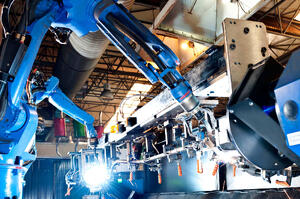 Capital equipment manufacturers face increasing global competition, which means they need to focus on quality, efficiency and customer satisfaction to retain their market share. The best way to manage those business aspects is with an effective ERP system, but it isn’t always easy to know what to look for when choosing a new system. Here are a few key concepts to consider.
Capital equipment manufacturers face increasing global competition, which means they need to focus on quality, efficiency and customer satisfaction to retain their market share. The best way to manage those business aspects is with an effective ERP system, but it isn’t always easy to know what to look for when choosing a new system. Here are a few key concepts to consider.
Visual scheduling
Speed is of the essence in production today. Planners, schedulers and shop supervisors don’t have time to pore over detailed reports to find the information they need. Modern ERP systems provide graphical workbenches or schedules that make it simple to pick out the top priorities or to revise schedules on the fly.
Lot and serial control
Even if you’re not in a regulated industry, lot and serial control can help to simplify equipment setup at customer sites or reduce the cost and complexity of future maintenance by ensuring that the right parts and spares are available as needed to support the as-built or as-maintained configuration.
Engineering change management
Automating your engineering change orders (ECO) process helps your implement product changes quicker—by allowing for simultaneous approvals and eliminating the need to print and copy volumes of paper for multiple approval packets. The faster you incorporate ECOs into production, the less scrap and rework may be necessary, so an effective engineering change management system helps to control costs while improving product quality.
System architecture
Most search teams neglect evaluating a prospective ERP system’s architecture because they feel that is only of concern to the IT team. However, every member of the search team should be concerned about the ease of integration with the chosen system, because as the company grows, it will become increasingly important to ensure that the company can add new functionality such as a CRM system or upgraded financials without having to replace the entire ERP.
It is not necessary for every team member to delve into the ERP system’s bits and bytes to understand the vendor’s position on this. Simply asking whether it works with other accounting or CRM packages will suffice.
Manufacturing part number control
Suppliers, customers and the industrial equipment manufacturer each have their own part-numbering schema, and it can be complex to keep it straight. When multiple suppliers or manufacturers supply components, the situation becomes even more complex. A cross reference capability that keeps the relationship straight saves time and reduces errors.
Industry focus
One of the first and most important things you should determine as you begin your search is whether the ERP vendor has experience in your industry. If the ERP company focuses on capital equipment, they will understand your industry challenges and speak your language without requiring an education at your expense. They should have reference customers who have faced similar issues, and their implementation and support teams should be knowledgeable about best practices. You cannot overstate the importance of selecting an ERP vendor who understands your industry.
By focusing on a few key pieces of functionality, a flexible and adaptable architecture and a vendor with experience in the captial equipment manufacturing industry, your ERP selection process will go smoothly, and your system will serve the company well for many years to come.





